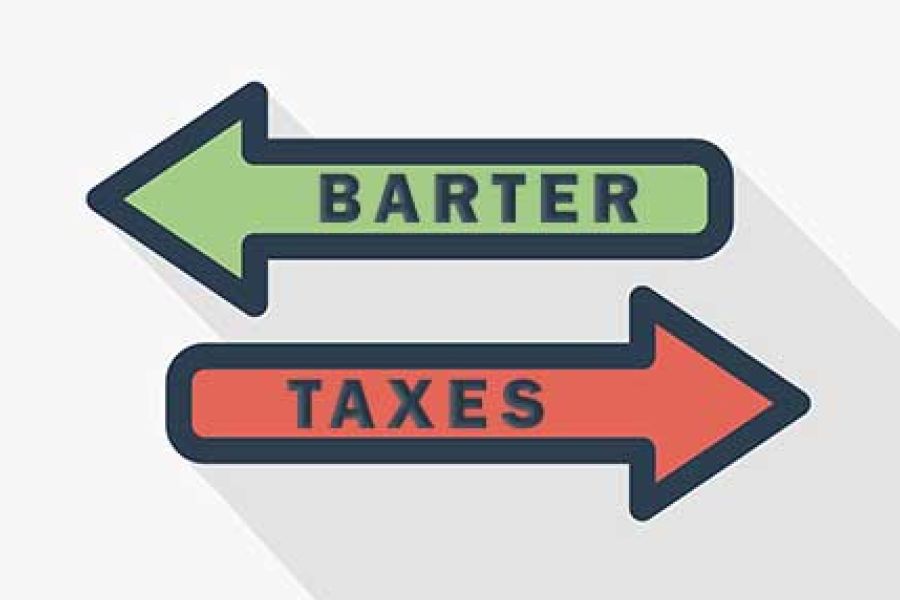Small businesses may find it beneficial to barter for goods and services instead of paying cash for them. But know that bartering is a taxable transaction. The fair market value of goods that you receive in bartering is taxable income. And if you exchange services with another business, the transaction results in taxable income for both parties. Income is also realized if services are exchanged for property. For example, if a construction firm does work for a retail business in exchange for unsold inventory, it will have income equal to the fair market value of the inventory. Barter clubs Many business owners join barter clubs that facilitate barter exchanges. In general, these clubs use a system of “credit units” that are awarded to members who provide goods and...

Fraud experts have long known that “dark web” sites provide information, support and illicit goods to hackers and other criminals. But security company Terbium Labs recently published a report analyzing a treasure trove of fraud guides for sale on shady sites. Fraud guides help criminals hack your data. These “educational” publications provide crooks with detailed instructions on exploiting security weaknesses to hack networks, obtain financial information and steal identities. Effective tips While fraud guides help criminals, Terbium found that most of the guides it downloaded were relatively useless. Still, there were plenty that provided effective tips on compromising networks and disrupting antifraud procedures. The guides cover everything from account takeovers to phishing to counterfeit documents to stolen credit cards. Often, they discuss specific companies. For example, a...
A common estate planning mistake that people make is owning property with a family member. True, adding a loved one to the title of your home, bank account or other property can be a simple technique for leaving property to that person without the need for probate. But any convenience gained is usually outweighed by a variety of negative consequences. Here are four: (1) Higher gift and estate taxes Depending on the size of your estate, owning property with a family member may trigger gift and estate taxes. When you add a family member’s name to an asset’s title as joint owner, for example, it’s considered a taxable gift of half the asset’s value. And your interest in the asset — including any future appreciation — remains...
When businesses are defrauded, courts can — and in some states must — order restitution. But calculating fraud damages isn't that simple. It isn’t always easy for judges to decide how much a company has lost. That’s where fraud experts can help. Calculating fraud damages: Benefit of the bargain method At first glance, calculating restitution may seem easy: Someone steals $25,000, so he or she should repay that amount, perhaps with interest. But what about the profits the business lost because of the fraud? The answer varies by state and even by case. Experts typically use either the “benefit of the bargain” or “out of pocket” rule to determine damages. The appropriate method depends to some degree on the location and nature of the fraud. But in most...
The Tax Cuts and Jobs Act (TCJA) has changed the landscape for business taxpayers. These changes have caused many business owners to ask: Which entity is most suitable for me? TCJA introduced a flat 21% federal income tax rate for C corporations. Under prior law, profitable C corporations paid up to 35%. TCJA also cut individual income tax rates, which apply to sole proprietorships and pass-through entities, including partnerships, S corporations, and LLCs (treated as partnerships for tax purposes). However, the top rate dropped from 39.6% to only 37%. Which entity is most suitable: Entity tax basics Before the TCJA, conventional wisdom was that most small businesses should be set up as sole proprietorships or pass-through entities to avoid the double taxation of C corporations. A C corporation pays...
Divorce necessitates an estate plan review. It’s important to review your estate plan as early as possible, for two reasons: You may wish to revise your plan immediately to prevent your spouse from inheriting or gaining control over your assets if you die or become incapacitated before the divorce is final. Although a divorce judgment or settlement automatically extinguishes certain of your former spouse’s rights, some documents must be modified to ensure that he or she doesn’t receive unintended benefits. Consider revising your will and any revocable trusts to exclude your spouse. Note that, in many states, your spouse will retain elective share or community property rights to a portion of your estate until the marriage ends. But revising your will or trust will limit your spouse...
Using data analysis to detect fraud is changing the way many businesses operate. It’s also changing how forensic accountants do their jobs, providing fraud experts with the means to mine massive mounds of data like never before. USING DATA ANALYSIS TO DETECT FRAUD: 3 TECHNIQUES These analytical techniques are among the most efficient and effective at detecting occupational fraud: (1) Association analysis This method can help identify suspicious relationships by quantifying the odds of a combination of data points occurring together. In other words, it calculates the likelihood that, if one data point occurs, another will, too. If the combination occurs at an atypical rate, a red flag goes up. For example, association analysis might find that a certain supervisor tends to be on duty when inventory theft occurs. (2)...
To help defray health care costs, many people now contribute to, or are thinking about setting up, Health Savings Accounts (HSAs). With these accounts, individuals can pay for certain medical expenses on a tax advantaged basis. But, is a Health Savings Account right for you? Is a Health Savings Account right for you: The basics With HSAs, you take more responsibility for your health care costs. If you’re covered by a qualified high-deductible health plan, you can contribute pretax income to an employer-sponsored HSA — or make deductible contributions to an HSA you set up yourself. You own the account, which can bear interest or be invested. It can grow tax-deferred, similar to an IRA. Withdrawals for qualified medical expenses are tax-free, and you can carry over a...
You’ve probably seen or heard ads urging you to donate your car to charity. “Make a difference and receive tax savings,” one organization states. But donating a vehicle may not result in a big tax deduction — or any deduction at all. Donating your vehicle, trading it in, or selling it? Let’s say you’re buying a new car and want to get rid of your old one. Among your options are trading in the vehicle to the dealer, selling it yourself or donating it to charity. If you donate, the tax deduction depends on whether you itemize and what the charity does with the vehicle. For cars worth more than $500, the deduction is the amount for which the charity actually sells the car, if it sells without...
Kickbacks return a portion of the money exchanged in a business transaction as compensation for favorable treatment. They’re illegal in the United States and many other countries. Don't mistake kickbacks for gifts. Because kickbacks are often disguised as gifts, travel and entertainment, they can be hard to identify. Don't mistake kickbacks for gifts: intention of the gift-giver Gifts, gratuities or courtesies of modest value associated with ordinary business practices are usually acceptable. The key consideration is the intention of the giver. Your employees shouldn’t accept any gift offered with the intent to improperly influence business decisions — or that would give the impression of compromising the employee’s ability to act in the best interests of the company. The same integrity test should be applied in deciding whether to...
- 1
- 2
- 3
- 4
- 5
- 6
- 7
- 8
- 9
- 10
- 11
- 12
- 13
- 14
- 15
- 16
- 17
- 18
- 19
- 20
- 21
- 22
- 23
- 24
- 25
- 26
- 27
- 28
- 29
- 30
- 31
- 32
- 33
- 34
- 35
- 36
- 37
- 38
- 39
- 40
- 41
- 42
- 43
- 44
- 45
- 46
- 47
- 48
- 49
- 50
- 51
- 52
- 53
- 54
- 55
- 56
- 57
- 58
- 59
- 60
- 61
- 62
- 63
- 64
- 65
- 66
- 67
- 68
- 69
- 70
- 71
- 72
- 73
- 74
- 75
- 76
- 77
- 78
- 79
- 80
- 81
- 82
- 83
- 84
- 85
- 86
- 87
- 88
- 89
- 90
- 91
- 92
- 93
- 94
- 95
- 96
- 97
- 98
- 99
- 100
- 101
- 102
- 103
- 104
- 105
- 106
- 107
- 108
- 109
- 110
- 111
- 112
- 113
- 114
- 115
- 116
- 117
- 118
- 119
- 120
- 121
- 122
- 123
- 124
- 125
- 126
- 127
- 128
- 129
- 130
- 131
- 132
- 133
- 134
- 135
- 136
- 137
- 138
- 139
- 140
- 141
- 142
- 143
- 144
- 145
- 146
- 147
- 148
- 149
- 150
- 151











